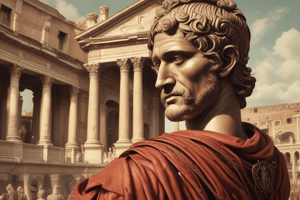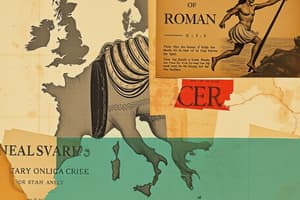Podcast
Questions and Answers
Как произошло расширение территории Древнего Рима?
Как произошло расширение территории Древнего Рима?
- С помощью подавления политических конфликтов и проведения жёсткой экономической политики
- С помощью дипломатических переговоров и заключения союзов с соседними государствами
- За счёт культурного и языкового освоения территорий соседних государств
- За счёт военного завоевания и установления колоний за пределами своих границ (correct)
Какой населённый пункт был одной из первых колоний Древнего Рима?
Какой населённый пункт был одной из первых колоний Древнего Рима?
- Калес (correct)
- Сицилия
- Кальяри
- Апулия
Какую роль играл сенат в раннем периоде Римской республики?
Какую роль играл сенат в раннем периоде Римской республики?
- Сенат был ответственен за организацию военных походов и управление колониями
- Сенат отвечал за распределение земель между римскими гражданами
- Сенат контролировал все политические решения в Римской республике (correct)
- Сенат играл роль консульского органа, осуществляя надзор за всеми сферами жизни
Какие методы были использованы Древним Римом для расширения своего влияния?
Какие методы были использованы Древним Римом для расширения своего влияния?
Какой регион стал более значимым после установления власти этрусков в Древнем Риме?
Какой регион стал более значимым после установления власти этрусков в Древнем Риме?
Какую роль сыграло Сенатское совещание в территориальном расширении Древнего Рима?
Какую роль сыграло Сенатское совещание в территориальном расширении Древнего Рима?
Какова была роль патрициев в Сенате?
Какова была роль патрициев в Сенате?
Какую роль играло Трибус (племенное собрание) в Сенате?
Какую роль играло Трибус (племенное собрание) в Сенате?
Когда Риму требовался военный лидер, назначался...
Когда Риму требовался военный лидер, назначался...
Каким образом влияние Сената на правительство Древнего Рима оказалось неAbsolute?
Каким образом влияние Сената на правительство Древнего Рима оказалось неAbsolute?
Flashcards are hidden until you start studying
Study Notes
The Origins of the Roman Republic
Expansion of Roman Territory
Rome's transformation into a republic began with the overthrow of the Etruscan king Tarquinius Superbus in 509 BCE. This marked the end of the Roman monarchy and the beginning of a new form of government. However, the early years of the Republic were not characterized by immediate expansion. Instead, Rome struggled with political issues and external conflicts for much of the 5th century BCE.
During the 6th century BCE, Rome had become one of the more important states in Latium, a region in central Italy, due to the achievements of its Etruscan overlords. However, it wasn't until the late 6th century BCE that Rome began to expand its territory. This expansion was not solely due to military conquest but also owed to the establishment of colonies, which allowed Rome to extend its influence beyond its immediate borders.
One of Rome's earliest colonies was Cales. Established in 528 BCE, it was populated by Roman citizens who were granted land in exchange for military service. This was a common practice, and other colonies were established in Sicily, Campania, and Apulia, among other regions.
As Rome's territory expanded, so did its influence. By the end of the 4th century BCE, Rome controlled much of Italy and had established a significant presence in the Mediterranean world. This expansion continued throughout the 3rd and 2nd centuries BCE, with Rome eventually dominating an area from the North Sea to the Middle East.
Role of the Senate
The expansion of Roman territory was not solely due to military might but also the establishment of a stable government. The Senate, an advisory council that had likely existed under the monarchy, played a crucial role in the early years of the Republic. It advised both the magistrates and the Roman people and wielded enormous power due to the collective prestige of its members.
Initially, the Senate was composed primarily of patricians, the wealthy and powerful families of Rome who held political and religious offices. However, the plebeians, or common citizens, demanded greater representation and influence in the government. This led to the establishment of the tribal assembly, a non-military civilian assembly that elected those magistrates who did not exercise imperium (military power).
Despite its role in advising the government, the Senate's power was not absolute. In times of military emergency, Rome appointed a dictator who could hold supreme military command for up to six months. This system ensured that the military could be effectively commanded while maintaining a balance of power.
In summary, the expansion of Roman territory and the role of the Senate were intertwined. The establishment of a stable government, represented by the Senate, allowed Rome to expand its influence and territory.
Studying That Suits You
Use AI to generate personalized quizzes and flashcards to suit your learning preferences.




